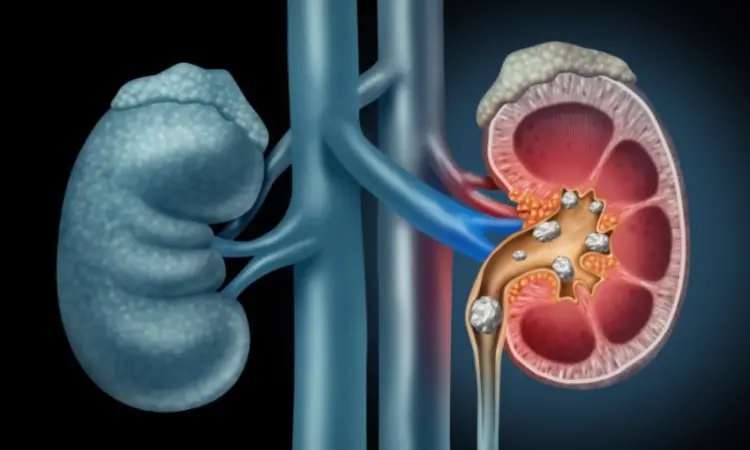- Home
- Medical news & Guidelines
- Anesthesiology
- Cardiology and CTVS
- Critical Care
- Dentistry
- Dermatology
- Diabetes and Endocrinology
- ENT
- Gastroenterology
- Medicine
- Nephrology
- Neurology
- Obstretics-Gynaecology
- Oncology
- Ophthalmology
- Orthopaedics
- Pediatrics-Neonatology
- Psychiatry
- Pulmonology
- Radiology
- Surgery
- Urology
- Laboratory Medicine
- Diet
- Nursing
- Paramedical
- Physiotherapy
- Health news
- Fact Check
- Bone Health Fact Check
- Brain Health Fact Check
- Cancer Related Fact Check
- Child Care Fact Check
- Dental and oral health fact check
- Diabetes and metabolic health fact check
- Diet and Nutrition Fact Check
- Eye and ENT Care Fact Check
- Fitness fact check
- Gut health fact check
- Heart health fact check
- Kidney health fact check
- Medical education fact check
- Men's health fact check
- Respiratory fact check
- Skin and hair care fact check
- Vaccine and Immunization fact check
- Women's health fact check
- AYUSH
- State News
- Andaman and Nicobar Islands
- Andhra Pradesh
- Arunachal Pradesh
- Assam
- Bihar
- Chandigarh
- Chattisgarh
- Dadra and Nagar Haveli
- Daman and Diu
- Delhi
- Goa
- Gujarat
- Haryana
- Himachal Pradesh
- Jammu & Kashmir
- Jharkhand
- Karnataka
- Kerala
- Ladakh
- Lakshadweep
- Madhya Pradesh
- Maharashtra
- Manipur
- Meghalaya
- Mizoram
- Nagaland
- Odisha
- Puducherry
- Punjab
- Rajasthan
- Sikkim
- Tamil Nadu
- Telangana
- Tripura
- Uttar Pradesh
- Uttrakhand
- West Bengal
- Medical Education
- Industry
Is Ureteroscopy beneficial in pregnant females with symptomatic urolithiasis? Study sheds light

CHINA: According to a recent study published in BMC Urology, ureteroscopy and internal ureteral stents have little to no effect on fertility outcomes when used to treat pregnant patients with symptomatic urolithiasis, and when circumstances allow, URS may be more beneficial for pregnant patients with urinary stones.
It has been estimated that between 1 in 2000 and 1 in 200 pregnant women have symptomatic urinary tract stones. The most common therapies for pregnant women with symptomatic urolithiasis include ureteroscopy (URS) and internal ureteral stents. The placement of a double-J (D-J) stent is a temporary measure, and there are few studies on this procedure, until definitive treatment during the postpartum period. URS has emerged as the standard of care for the treatment of ureteric stones in pregnancy as a result of ongoing improvements in endoscopic technology and endourological procedures.
The researchers aimed to compare the effectiveness of ureteroscopy (URS) against internal ureteral stents in treating urolithiasis in pregnant women.
For this objective, through meticulous literature searches, pertinent studies released between January 1980 and June 2022 were found. In the beginning, 499 studies were found. They included pregnant women of any gestational stage who underwent double-J (D-J) stent implantation alone or ureteroscopy for the treatment of urolithiasis; a study was considered included if it had more than 10 participants. Finally, a total of 25 studies were identified, with 789 individuals undergoing URS and 131 cases undergoing serial stenting.
Conclusive points of the study:
- For the placement of D-J stents and URS, the combined surgical success rate was 97% and 99%, respectively.
- After successive D-J stenting, very few patients spontaneously passed stones. Approximately 91% of the stones in URS procedures were free of obstructions.
- The rate of successful conception after internal ureteral stent therapy was 99%, despite the fact that problems were reported collectively on average at a rate of about 45%.
- The frequency of problems was pooled 1% for the group getting URS treatment, and the percentage of normal fertility outcome was 99%.
- The combined rate of abortion and preterm birth was the same (<1%) and the two groups' rates of significant complications were likewise comparable.
In conclusion, ureteroscopy and internal ureteral stents are both risk-free and productive procedures for women who have symptomatic urolithiasis during pregnancy. The authors came to the conclusion that internal ureteral stents can be taken into consideration in emergencies or other unique scenarios because they have been shown to be secure and efficient.
REFERENCE
Jin, X., Liu, B., Xiong, Y. et al. Outcomes of ureteroscopy and internal ureteral stent for pregnancy with urolithiasis: a systematic review and meta-analysis. BMC Urol 22, 150 (2022). https://doi.org/10.1186/s12894-022-01100-w
Dr Kamal Kant Kohli-MBBS, DTCD- a chest specialist with more than 30 years of practice and a flair for writing clinical articles, Dr Kamal Kant Kohli joined Medical Dialogues as a Chief Editor of Medical News. Besides writing articles, as an editor, he proofreads and verifies all the medical content published on Medical Dialogues including those coming from journals, studies,medical conferences,guidelines etc. Email: drkohli@medicaldialogues.in. Contact no. 011-43720751


